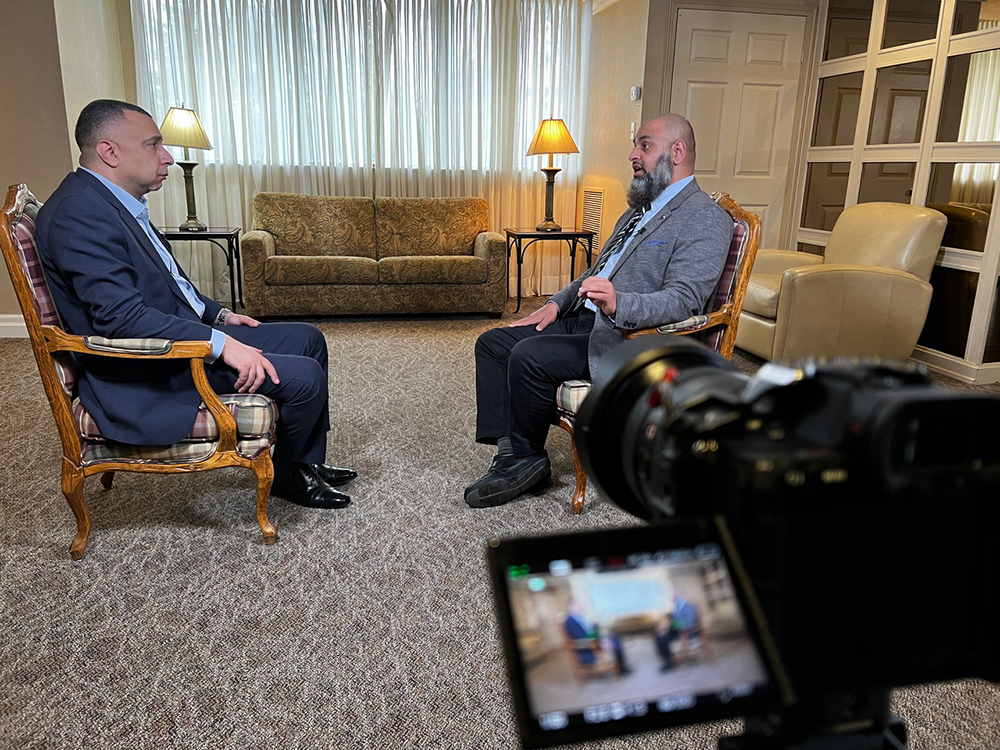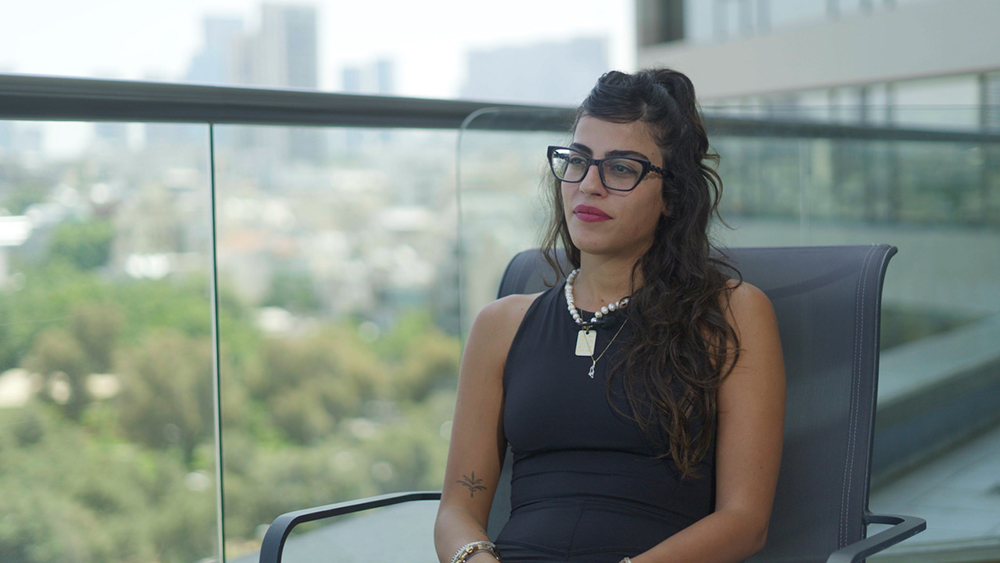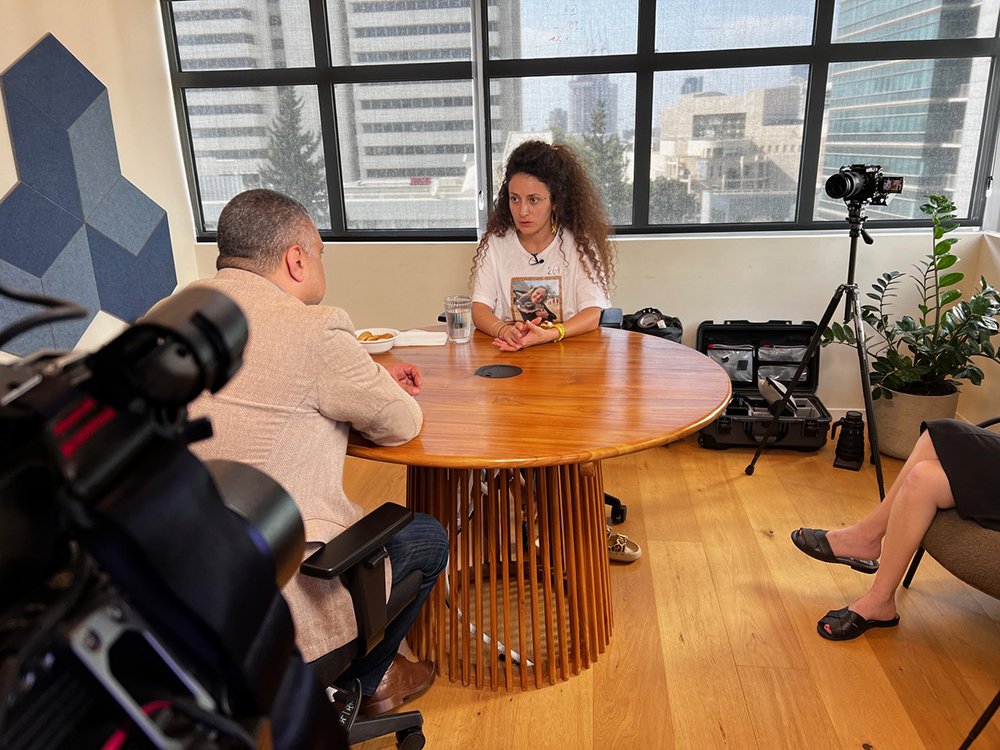|
Getting your Trinity Audio player ready...
|
Two Canadians team up on “Dying to Live” to combat anti-Israel misinformation.
By: Dave Gordon
Shortly after Hamas attacked southern Israel on Oct. 7, 2023, Chris Atkins flew out of Ben-Gurion International Airport. As news came through on his phone, the horrified Canadian filmmaker felt the urge to use his skills to tell the story of what was unfolding.
His friend, the Egyptian-born, Canadian human-rights advocate Majed El Shafie, felt the same way and hired a cameraman in Israel to document the atrocities. El Shafie asked Atkins to help sew the footage together. They agreed to keep working together, which led to their new documentary “Dying to Live,” which was screened for the first time in Toronto on Nov. 25.

The two Canadians, who aren’t Jewish, had worked previously on films, including those that chronicled human-rights violations in Pakistan and Afghanistan. “One of the things that we noticed was that pretty much everything that was coming out on Oct. 7 was made by Israelis or made by Jewish people,” Atkins told JNS. “We felt we had something no one else had.”
“For me as a non-Jewish Canadian filmmaker, I think what I bring is a perspective of Israel and Oct. 7 from a place where I have no stake in it,” he said. “I don’t have the vested interest of an Israeli or a Jew that the world would look at and say, ‘You’re biased, because of your religion or nationality.’”
Atkins told JNS that he gains nothing “by speaking the truth and sharing my experience and view of what happened on Oct. 7, so in theory, my film should hopefully not be dismissed as easily as the films made by Israelis.”
Although he said that many would expect El Shafie to “stand on the side of the pro-Palestine mob,” the latter brings “an even more powerful perspective, being an Egyptian Arab and a former Muslim who was raised with natural animosity for Israel,” Atkins said.
Growing up, “Israel” was a word that meant nothing to Atkins, he told JNS. He went to Israel in 2005 to work on a film.

“I’d never had any connections or interactions with Jewish people before,” he said. “It struck me how modern, how nice, how kind people were. In my mind, Israel had always been a place of dust, camels and war.”
He was quickly drawn to Israeli history, people and archaeology, he told JNS, and he has visited some 80 times in the past two decades.
“Each one of these moments just built a love and appreciation for Israel in me that has really shaped the last 20 years of my life,” he said.
‘It frustrated me’
Learning more about Israel on the ground also gave him a front-row seat to the “real disconnect” between what he saw and what the media was reporting.
“I think that’s really where it felt special to me because I was seeing something the rest of the world was not seeing,” Atkins told JNS. “I was getting to know these people on a level that anybody just watching them on TV would never ever get to experience.”
“It frustrated me that there was so much lies and misinformation about Israel, about the Jewish people, that it just put something in my heart that I felt I’ve been given this opportunity,” he added. “I needed to speak up.”
Through those eyes, “Dying to Live” leads viewers on a tour of some of the kibbutzim and the Nova music festival site that were devastated on Oct. 7. The film draws on interviews that El Shafie conducted with survivors, relatives of terror victims and others who were impacted by the attacks and incorporates archival footage from the Oct. 7 attacks.

‘We owe the dead the truth’
Michal Ohana, who shares her harrowing story in the film of being shot on Oct. 7 and hiding under a tank as she heard her friends being killed, told JNS that her message is that Hamas’s attacks offer a “powerful reminder” of Jew-hatred throughout history.
“We must fight antisemitism every single day” and bring all the hostages home, she told JNS before the screening. “If I have strength—if I have my voice—I feel that I can do something for them. That is what I am doing.”
No matter how hard it is to hear about what happened, “we owe the dead the truth,” she said. “We must also learn from it, fix the failures and create a better reality for future generations.”
Raheel Raza told JNS that it was an honor to be part of the documentary “as a Muslim voice speaking out against antisemitism and hate.”
“The message is clear. No matter who the perpetrators of evil are, they have to be called with moral courage and clarity,” she said. “Only then can we talk peace.”
El Shafie told JNS that he made the film because he doesn’t like lies and manipulation.
“I don’t like to watch the news and do nothing about it, or know of a crime and not do anything,” he said.
There are plans to translate the film into Arabic, Urdu and Farsi, according to the filmmakers.
“I’m just hoping that the movie will help the people to see the truth, to see the pain of the Israeli people, to understand the concept of evil that drove Oct. 7,” El Shafie said.




